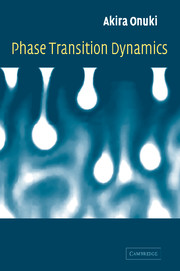3 - Mean field theories
Published online by Cambridge University Press: 13 August 2009
Summary
In this chapter we will introduce the simplest theory of phase transitions, the Landau theory [1]–[4]. It assumes a free energy H(ψ), called the Landau free energy, which depends on the order parameter ψ as well as the temperature and the magnetic field. The thermodynamic free energy F is the minimum of H(ψ) as a function of ψ. This minimization procedure gives rise to the mean field critical behavior. Historically, a number of mean field theories have been presented to explain phase transitions in various systems. They reduce to the Landau theory near the critical point. Examples we will treat are the Bragg–Williams theory [5] for Ising spin systems and alloys undergoing order–disorder phase transitions, the van der Waals theory of the gas-liquid transition [6], the Flory–Huggins theory and the classical rubber theory for polymers and gels. We will also discuss tricritical phenomena in the scheme of the Landau theory. In Appendix 3A elastic theory for finite strain will be considered, which will be needed to understand the volume-phase transition in gels.
Landau theory
Order parameter and constrained free energy
It is desirable to sum up the spin configurations in (1.1.9) to exactly determine the thermodynamic limit. This attempt has not been successful for the 3D Ising model, while it was successful for 2D and is a simple exercise for 1D [3].
- Type
- Chapter
- Information
- Phase Transition Dynamics , pp. 78 - 123Publisher: Cambridge University PressPrint publication year: 2002



